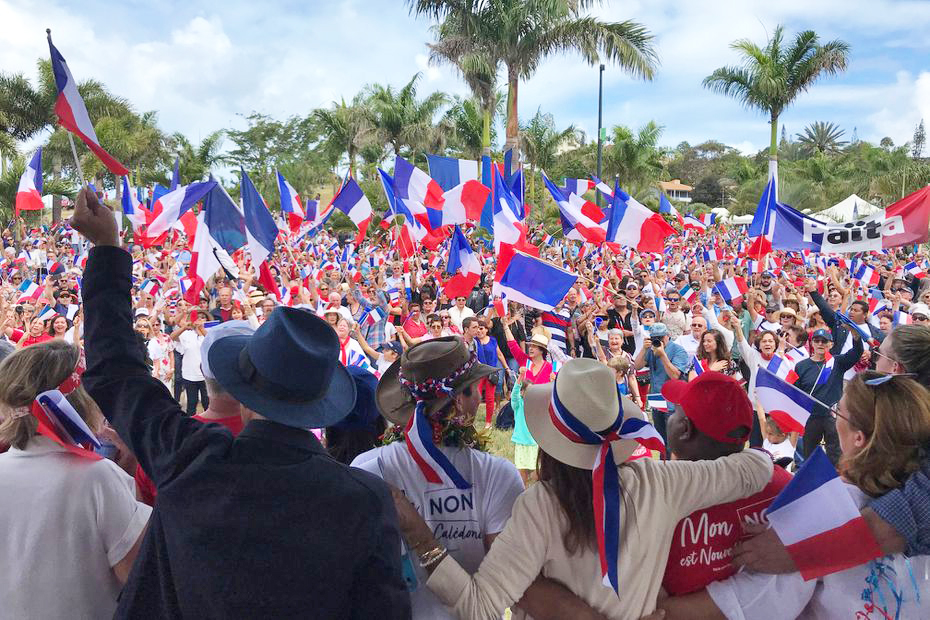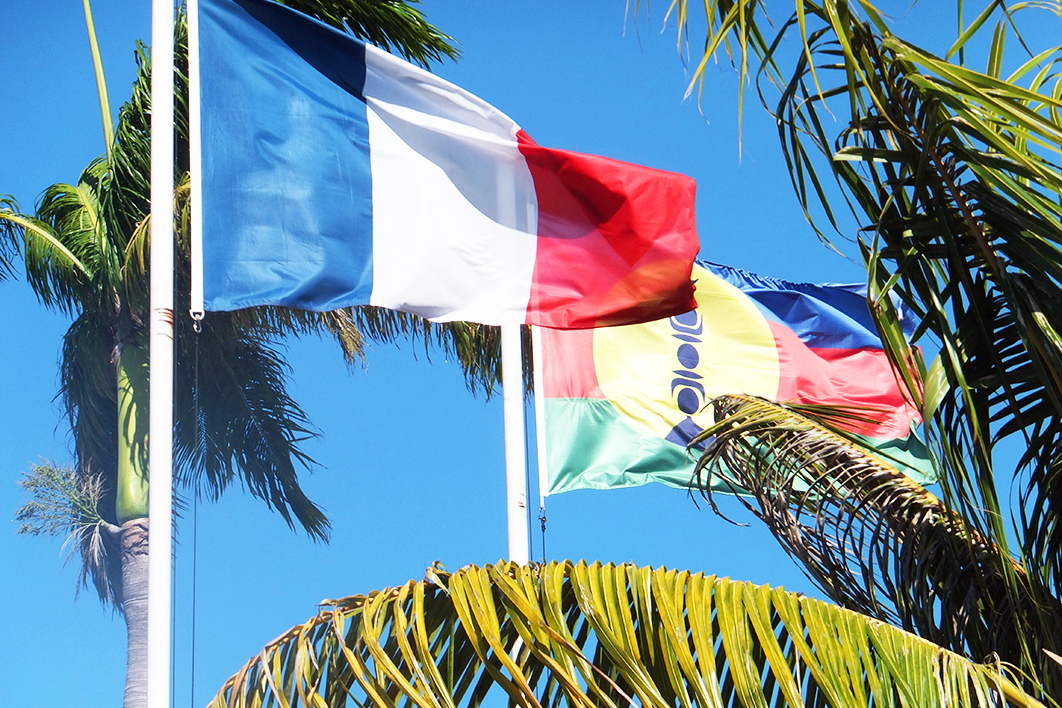When the crowd gathered in Parc Brunelet in July, the bleu-blanc-rouge flag was everywhere, fluttering in the breeze and adorning clothes, banners and sashes. The blue-white-red tricolour of the French Republic was the banner of choice for opponents of independence, as they gathered for the start of New Caledonia’s referendum campaign.
On 4 October, long-term residents of the French Pacific dependency will vote on New Caledonia’s future political status. Despite overwhelming support for independence among the indigenous Kanak people — nearly 40 per cent of the population — most non-Kanak voters want to retain ties with France. In an increasingly polarised debate, supporters and opponents of independence are seeking to mobilise their base, amidst the social and economic crisis caused by the global coronavirus pandemic.
The choice of Parc Brunelet for the rally — a green, open space in the wealthy southern suburbs of the capital, Noumea — was no accident. In the 1970s, conservative politician Jacques Lafleur used the same park to mobilise support for his new anti-independence party, Rassemblement pour la Calédonie dans la Republique. Under Lafleur’s often autocratic leadership, the party was the dominant political force in New Caledonia throughout the 1980s and 1990s, including during the violent clashes of 1984–88 known as Les évènements.
Many conservative politicians look back with longing to that era of right-wing hegemony. Decades later, Lafleur’s Rassemblement party, now led by New Caledonian president Thierry Santa, is just one of a range of conservative, anti-independence parties. This fragmentation on the right reflects widespread uncertainty about the best way to respond to the call for sovereignty from the Front de Libération Nationale Kanak et Socialiste, or FLNKS, and other pro-independence forces.
In a system without compulsory voting, each campaign must mobilise supporters to turn out to the polls — a process that draws on emotion as well as considered decisions. For this reason, the use of flags has become fraught during the referendum campaign, pitting the bleu-blanc-rouge against the multicoloured flag of Kanaky.
Independence parties unsuccessfully lodged a case before France’s highest administrative court, claiming the partisan use of the French tricolour undercuts the supposed neutrality of the French state during the referendum. For FLNKS spokesperson Daniel Goa, “The use of the French flag is very restricted. Here in New Caledonia, the question is not a choice between France and New Caledonia. It is to prepare for the exit of France.”
Less predictably, Philippe Gomes, leader of the anti-independence Calédonie Ensemble, says that his party’s No to independence “is not a bleu-blanc-rouge No.” Gomes, who represents New Caledonia in the French National Assembly in Paris, says the other anti-independence parties have “bleu-blanc-rouge everywhere” in their campaign materials. “For us, the flag is on the corner of our material, but we’re talking about this country, about New Caledonia. For this reason we couldn’t participate in their radical campaign, that is in part racist, very anti-Islander and very anti-independence. This can’t bring anything good to the country.”
The French state, FLNKS and conservative anti-independence parties reached an agreement known as the Noumea Accord in May 1998, setting out a decolonisation process for New Caledonia. Entrenched in the French Constitution the following year, the Noumea Accord proposed measures of economic and social “rebalancing” and set out a twenty-year transition towards a new political status. After the transfer of legal and administrative powers to local institutions between 1998 and 2018, the colonised Kanak people and other long-term residents of New Caledonia would vote in a referendum on self-determination. Uniquely, the Noumea Accord allowed another two referendums, if a first vote for independence was unsuccessful.
In November 2018, the first referendum under the Noumea Accord posed the question: “Do you want New Caledonia to accede to full sovereignty and become independent?” In an unprecedented turnout, 56.7 per cent of voters decided to remain within the French Republic, while 43.3 per cent voted Yes to independence. These bald figures, with a clear majority opposing full sovereignty, suggest a setback for the FLNKS. In reality, the size of the Yes vote surprised most conservative politicians and pundits, who had predicted an overwhelming and strategic defeat for the independence movement.
Today, three anti-independence parties make up the Avenir en Confiance (The Future with Confidence) coalition: Les Républicains Calédoniennes, led by Sonia Backes; Thierry Santa’s Rassemblement—Les Républicains; and the Mouvement Populaire Calédonien, led by Gil Brial. For the 2020 referendum, this coalition has created a new alliance, dubbed “The Loyalists,” with three more smaller parties: Pascal Vittori’s Tous Calédoniens; Nicolas Metzdorf’s Générations NC; and the Rassemblement National (the new name for the extreme right-wing National Front led by French politician Marine Le Pen).

Opponents of independence rally in Parc Brunelet in July displaying France’s bleu-blanc-rouge tricolour. Les Nouvelles Caledoniennes
This unwieldy grouping is united by the goal of boosting the No vote. As President Santa tells me, “Our objective is to improve the tally achieved in the first referendum. Amongst the 33,000 people who didn’t vote last time, the vast majority live in greater Noumea. I think a proportion of these people, who thought the result would be 70/30, didn’t bother to vote. But I think that the result in 2018 really disappointed them, and that will mobilise them to get out and vote the next time.”
On 7 September, The Loyalists alliance released a booklet setting out its vision for the future. Under the influence of Sonia Backes and other conservatives, it proposes policies to roll back advances made by the Kanak people since the 1988 Matignon-Oudinot Agreements and 1998 Noumea Accord.
The Loyalists plan to change the current division of government revenues among New Caledonia’s three provinces, reducing extra funding allocated to the Northern and Loyalty Islands provinces after decades of underdevelopment. Their policy proposes changes to the representation of the two Kanak-majority provinces in the Congress and also membership of the existing collegial, multi-party government that currently includes both supporters and opponents of independence. This change would allow the dominant majority after elections — currently an anti-independence majority — to propose laws to Congress.
The document calls for “dialogue” and “sharing” but promotes policies that will be fiercely resisted by the independence movement, at the ballot box and on the streets.
In spite of this unified statement, significant policy differences still exist within the anti-independence coalition — over nickel exports, the use of indigenous languages in schools and the funding of provincial administrations. But President Santa says it is vital to work together. “The key factor is that we are united and can multiply the number of activities thanks to our alliance,” he says. “We’ll be able to operate at many levels: to mobilise the members of our various parties, and coordinate actions around the country on behalf on one or another group. So I hope that the Loyalist campaign will be more effective than last time.”
Calédonie Ensemble is the only major anti-independence party that has refused to join this alliance. CE dominated local politics for a decade until 2019 provincial elections and is still a significant player: Gomes and fellow CE member Philippe Dunoyer hold New Caledonia’s two seats in the French National Assembly, and CE’s Gerard Poadja sits in the French Senate.
Shocked by the size of the 2018 independence vote, New Caledonia’s non-Kanak electorate punished CE during May 2019 provincial elections. Sonia Backes’s Avenir coalition carried the majority of the European electorate, with campaign meetings featuring the French national anthem and lots of French flags. Wealthy beachside suburbs in Noumea are a bastion of anti-independence support, and during the campaign CE’s Philippe Michel denounced Backes as a “white supremacist from the southern suburbs.”
In March 2020 municipal elections, CE also lost control of its long-term stronghold in the rural town of La Foa, where Philippe Gomes was mayor from 1989 to 2008. To rub salt in the wound, CE was defeated by a breakaway faction — Nicolas Metzdorf’s Générations NC. Metzdorf then took his new party into the Loyalists, stating, “We’re not all best buddies in the Loyalists, but at any given moment, the national interest must come first. We need unity.”
This bad blood is reflected in CE’s decision to run its own No campaign for the October referendum — a division that disappoints President Santa. “I remain convinced that there is no fundamental difference that justifies this parallel process,” he tells me. “When the Loyalist Front launched our social policies, to explain to New Caledonians our vision for the period after the Noumea Accord, we felt that there were many policies that were the same as those presented by Calédonie ensemble. So their claims that we are on a doctrinaire, anti-independence, even racist path, while they are promoting dialogue, negotiation and discussion — well, that’s just the artifice of a politician to justify his decision not to join the Loyalist alliance.”
Not surprisingly, Philippe Gomes says the opposite: “The National Front called for a vote against the Matignon Accords and also against the Noumea Accord. How could we sit around the table with people who have actively opposed the process we’ve undertaken over the last thirty years? We just don’t have the same political beliefs as those people.
“You also have the Avenir en Confiance led by Sonia Backes,” Gomes added. “The last proposal she put forward was for the partition of the country: when the Northern and Loyalty Islands provinces vote Yes for independence, they can become Kanaky while the Southern Province can remain part of France. But for us, the division of the country makes no sense. It is one and indivisible, you can’t cut it up like a sausage!”
In the lead-up to the November 2018 referendum, French prime minister Edouard Philippe and overseas minister Annick Girardin allocated extensive time and political capital to New Caledonia. Wrangling supporters and opponents of independence, Philippe managed to forge a consensus on the date for the referendum, the logistics of polling, who could vote and even the wording of the question.
But Philippe is gone. Just three months before this year’s referendum, Emmanuel Macron reshuffled his cabinet in Paris, appointing Jean Castex as prime minister and Sebastien Lecornu as minister responsible for France’s overseas collectivities.
Louis Mapou, head of the Union Nationale pour l’Indépendance parliamentary group within New Caledonia’s Congress, noted: “Until now, Edouard Philippe has been our interlocutor within the French State. The new prime minister — we don’t know him. We’ve met the new overseas minister, but not to discuss all the New Caledonian issues that are on the table since 1998.”
Overseas Minister Lecornu told the newspaper Les Nouvelles Calédoniennes that “there isn’t a day when the president of the Republic hasn’t asked me questions about what’s happening overseas in general and about New Caledonia in particular.”
CE’s Philippe Gomes is not persuaded. He says that New Caledonia is not high on the agenda in Paris, at a time when the new government faces more than 30,000 deaths from COVID-19, post-Brexit debates about the future of the EU and protests over domestic austerity.
“The French government is failing in its duty,” he says. “This year, the president of the French Republic made a major speech on television on 14 July, our national day. He talked for two hours. But the issue of New Caledonia was not even mentioned once, even though within two months we will decide whether to leave the French Republic! When the new prime minister, Castex, made his speech to the National Assembly, not one single word about New Caledonia.”
For, Gomes, this is starkly different from the first referendum. “In 2018, the government was very active,” he says. “The prime minister and the president of the French Republic both visited, they spent hundreds of hours talking with everybody and the referendum was organised after a consensus had been forged. Everyone was on board, agreeing about the manner in which the vote would be held. For this reason, the result could not be questioned, nor was it questioned. Today, the French government hasn’t done its job and the process is under challenge.”
Cynics might note that Gomes, as a member of the French National Assembly, is in a prime position to lobby the government. But he argues that the Macron administration has mishandled the process. “Even though they have a lot on their plate at the moment, they’ve made very bad decisions over the last two years in relation to New Caledonia,” he responds. “I don’t think they realise that 2020 is not simply a replay of 2018. I fear that when they do start to talk about New Caledonia, it will be too late.”
It’s worth noting that the independence movement doesn’t agree that Paris has dropped the ball. They have long argued the French government is actively working against independence, in spite of pledges of impartiality.
I spent weeks in New Caledonia covering the 2018 referendum campaign and trying to gauge the mood on the ground. Reporting from a distance this year, courtesy of pandemic restrictions, it’s still clear that the mood is more polarised and anxious. Opponents of independence seem more fearful of the future, knowing the independence vote last time was tantalisingly close to 50 per cent. And they have many questions. Will citizens of an independent New Caledonia retain their French passport and access to the European Union? Will France continue to fund a range of social services and welfare payments? What about the Chinese?
The FLNKS has mounted a public campaign to respond to these queries, but loyalist politicians have seized on documents showing the independence movement is negotiating directly with the French state, hoping to set parameters for any post-referendum transition to nationhood. The classic fear of a stab in the back from Paris motivates many conservative New Caledonians, especially those who have migrated from Algeria, Vanuatu and other former French colonies.
Given that a third referendum is possible under the Noumea Accord, Philippe Gomes believes that the independence movement can win this year without reaching 50 per cent. “We know that the independence movement desperately wants to increase their score this time, because that would be a very powerful psychological blow for people opposed to independence,” he says. “The same is true for our movement: we want to hold steady or increase our score! If they manage to increase their Yes vote by two or three per cent, our people will feel the independence movement breathing down their neck. This is another element that explains the polarisation of debate at the moment.”
Politics in New Caledonia’s Congress is heating up as the vote gets closer. This month, Calédonie ensemble joined independence groups and the Wallisian party Eveil océanien to vote for a special budget debate, reviewing proposed French loans to cope with the loss of trade and tourism during the pandemic. President Santa sees this unholy alliance as a vote of no confidence in his multi-party government, which includes members from all these groups.
Despite these tensions, New Caledonia’s political elite works together on common concerns through congressional committees, provincial assemblies and the multi-party Government of New Caledonia.
But Philip Gomes argues that personal connections among professional politicians can founder when the stakes get high: “If you look at the press statements by Sonia Backes of Les Républicains Calédoniennes or Daniel Goa of Union Calédonienne, they threaten each other that they’ll go back to the barricades, as we saw in the 1980s. We are in a period where the debate is very black and white, yes or no, for or against. Given this binary choice, people are reacting more and more with their guts and less and less with their head. That’s not good in a small island society with its multiple cultures and identities, which has already suffered too much.”
President Santa agrees that the public debate is sharper. “In my opinion, we are not yet at a stage where we need to worry, but I can’t say otherwise than there’s an increasing mood of tension. We’ve seen a radicalisation of political language. And of course, when political speech is radical, it can create a response from people at the base. This is true for both sides, not just the independence movement, but unfortunately also from the supporters of France.”
With just weeks before the vote, the path to decolonisation still faces many hurdles. •
Reporting for this article was supported by a Sean Dorney Grant for Pacific Journalism through the Walkley Public Fund.





